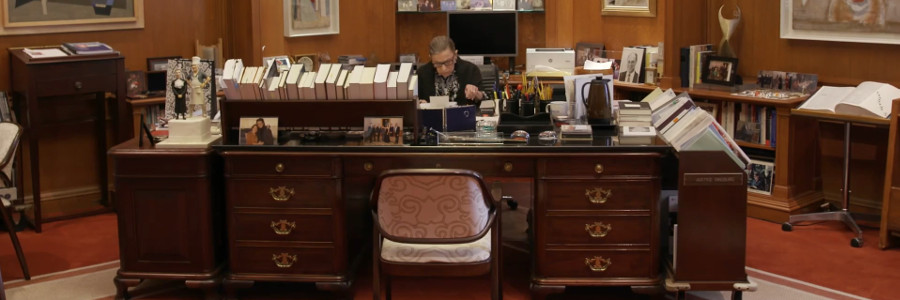The focus of documentary RBG is not so much the story of Associate Justice Ruth Bader Ginsburg’s life as it is her work. Work that kept her up so late at night that she spent every weekend in bed catching up on sleep. Work that drove her so selflessly that she sometimes had to be physically expelled from her office so that she would eat.
Work that redefined the world for American women.
Before she was a meme, emblazoned on t-shirts and Tumblr, the so-named ‘Notorious’ RBG was an icon for post-war women looking to establish an identity beyond that of housewife. For nearly half a century, she has strived across the nation’s courts for gender equality, while dealing with the discrimination and ignorance of her detractors.
Ginsburg’s journey to the Supreme Court is charted broadly, if sometimes a little superficially, by co-directors Julie Cohen and Betsy West. The pair gained significant access to and support from Ginsburg in the development of the project, as evidenced by the amount of family photos and interviews with close friends on display. These add colour, humour, and emotion to the story, pairing nicely with Ginsburg’s graceful and direct reflections.
Framed around her confirmation hearings, RBG spends much of its 96 minutes exploring the landmark cases of Ginsburg’s career. From the first case she presented to the Supreme Court, which resulted in women in the Air Force receiving the same housing benefits as their male counterparts, to the dissents that brought her public attention, the documentary takes time establishing each scenario, talking to the people involved, presenting Ginsburg’s arguments, and discussing the results.
Each controversial case made Ginsburg feel like a “kindergarten teacher”, she says earnestly. She wasn’t working against intolerance, but a blanketing ignorance of how discriminating legislature negatively impacted the lives and careers of both men and women.
To change laws, she’d have to change minds. She’d have to teach. And by sticking to her motto – “be a lady, and be independent” – she did. RGB is at its best when it examines how Ginsburg won over the likes of Republican Senator Orrin Hatch (who, the documentary does not note, was the one who suggested her for the Supreme Court) and infamously conservative former Justice Antonin Scalia, because it’s through these moments that we best understand who she is.
Where the documentary loses sight of the real Ginsburg is in sequences that seek to align her with the persona the internet has established for her. When we see her working out while wearing a shirt that reads ‘Super Diva!’, or hear people constantly joking about the fact she can’t cook, RGB‘s potency wains.
In one scene, Ginsburg watches Kate McKinnon spoof her on Saturday Night Live. She laughs along, but when the directors ask Ginsburg if the portrayal reminds her of herself, she says no.
Of course it’s not. The film has established Ginsburg as shy, modest, sober. While she does seem to enjoy the Notorious RBG image, it’s not who she is, and the documentary spends too much time on it.
That time would have been better spent talking to some of the people who disagree with her rulings. Not the people who we hear calling her a “witch” and a “zombie” in the opening sequence, but those whose perspective on the law put her views into conflict with theirs. Undeniably, gender discrimination posed significant challenges throughout Ginsburg’s early career, but her profession surely posed other challenges that are absent from the discussion here. It’s a shame, considering both the access the team had and Ginsburg’s age (she’s 85), that this line isn’t probed, for there might not be a better chance to do so.
Regardless, RBG is a well made documentary that covers all the highlights of Ginsburg’s extraordinary career, even if it doesn’t offer any new insights or challenge the popular perspective of its subject. Fans will likely see it regardless, and those audience members who aren’t fans yet surely will be by the time the credits roll.
—
RBG releases in cinemas July 26th.
For more info on Ginsburg, you can read our biography here.

